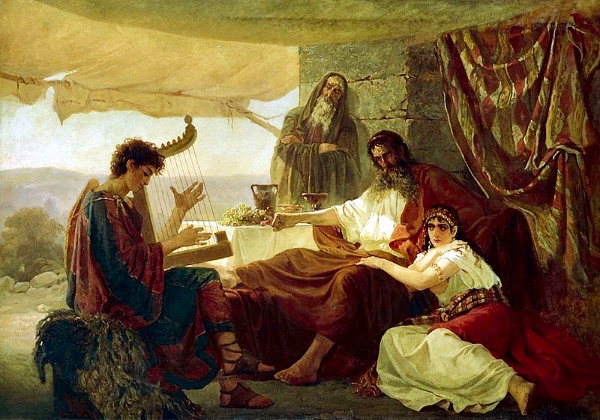I was singer to my clan in that dim, red Dawn of Man …

This light-hearted verse points out that while human nature does not change (Still we let our business slide – as we dropped the half-dressed hide – To show a fellow-savage how to work), literary style is a convention of a particular time and culture, not to be regarded as an unalterable dogma. The poem is noteworthy, among other things, for one of Kipling’s most famous lines (which I have seen chalked on a wall of Kathmandu’s most popular bars) -” and the wildest dreams of Kew are the facts of Kathmandu/ And – every – single – one – of – them – is – right!”
In the Neolithic Age
In the Neolithic Age savage warfare did I wage For food and fame and woolly horses' pelt. I was singer to my clan in that dim, red Dawn of Man, And I sang of all we fought and feared and felt. Yea, I sang as now I sing, when the Prehistoric spring Made the piled Biscayan ice-pack split and shove; (1) And the troll and gnome and dwerg, and the Gods of Cliff and Berg (2) Were about me and beneath me and above. But a rival, of Solutré, told the tribe my style was outré (3) 'Neath a tomahawk, of diorite, he fell. And I left my views on Art, barbed and tanged, below the heart (4) Of a mammothistic etcher at Grenelle.(5) Then I stripped them, scalp from skull, and my hunting-dogs fed full, And their teeth I threaded neatly on a thong; And I wiped my mouth and said, "It is well that they are dead, "For I know my work is right and theirs was wrong." But my Totem saw the shame; from his ridgepole-shrine he came, And he told my in a vision of the night: - "There are nine and sixty ways of constructing tribal lays, "And every single one of them is right!" . . . . . . . Then the silence closed upon me till They put new clothing on me Of whiter, weaker flesh and bone more frail; And I stepped beneath Time's finger, once again a tribal singer, And a minor poet certified by Traill! (6) Still they skirmish to and fro, men my messmates on the snow When we headed off the aurochs turn for turn; (7) When the rich Allobrogenses never kept amanuenses, (8) And our only plots were piled in lakes at Berne. Still a cultured Christian age sees us scuffle, squeak, and rage, Still we pinch and slap and jabber, scratch and dirk; (9) Still we let our business slide - as we dropped the half-dressed hide - To show a fellow-savage how to work. Still the world is wondrous large, - seven seas from marge to marge - And it holds a vast of various kinds of man; And the wildest dreams of Kew are the facts of Khatmandhu, And the crimes of Clapham chaste in Martaban. (10)
Notes
[1] i.e. when the Ice Age was ending and ice-pack still covered the Bay of Biscay.
[2] ‘Dwerg’ – dwarf.
[3] ‘Outré’ – outrageous. The spectacular Rock of Solutré in southern France, where men used to hunt wild horses, was actually the site of Upper Paleolithic (Old Stone Age), not Neolithic (New Stone Age), civilization – but what will not a poet overlook for a rhyme?
[4] ‘Tanged’ – pronged.
[5] ‘Grenelle’ – now a part of the XV District in the Paris Left Bank. To my knowledge no mammoth etchings have been discovered there, but it ties well with the last verse – “Here’s my wisdom for your use, as I learned it when the moose / and the reindeer roamed where Paris roars to-night”.
[6] H.D. Traill was the first editor of “Literature” magazine, a political satirist, biographer and critic, whose reputation was well-established when Kipling wrote this poem. In March 1892, a few months before Tennyson’s death, Traill wrote an article bemoaning the fact that there was no poet with sufficient stature to replace him as England’s Poet Laureate. He named fifty poets whom he considered “minor”; then in a postscript he apologized for having overlooked the new young writer Kipling, and for the merit of ‘The Ballad of East and West’ awarded him the fifty-first place on the list, thus making him “a minor poet certified by Traill”.
[7] ‘Auroch’ – wild ox.
[8] ‘Allobrogenses’ – A Celtic tribe of ancient Gaul (France); ‘Amanuenses’ – scribes.
[9] ‘Dirk’ – to stab with a dagger.
[10] ‘Martaban’ – in the Burmese jungles.
